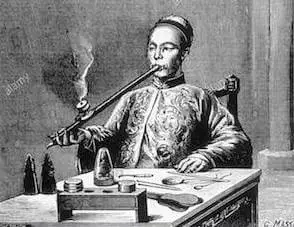A ‘pipe dream’ is an unrealistic hope or fantasy.
Pipe dream
What's the meaning of the phrase 'Pipe dream'?
What's the origin of the phrase 'Pipe dream'?
The phrase ‘pipe dream’ is an allusion to the dreams experienced by smokers of opium pipes.
Opiates were widely used by the English literati in the 18th and 19th centuries. Samuel Taylor Coleridge was one of the best known users, and it would be difficult to claim that the imagery in surreal works like Kubla Khan owed nothing to opium. Lewis Carroll, although not known to be an opium user himself, makes clear allusions to drug use in Alice’s Adventures in Wonderland. Sir Arthur Conan Doyle has his hero Sherlock Holmes visit an opium den – although that was for research rather than consumption.
It’s strange then that ‘pipe dream‘ comes from none of these sources but has an American origin. The early references to the phrase all originate from in or around Chicago. The earliest I have found is from The Chicago Daily Tribune, December 1890:
“It [aerial navigation] has been regarded as a pipe-dream for a good many years.”
The first printed piece that associates the phrase with opium smoking is from The Fort Wayne Gazette, September 1895:
“There are things taking place every day in Chicago which are are devoid of rational explanation as the mysterious coinings of the novelist’s brain. Newspaper men hear of them, but in the rush for cold, hard facts, the ‘pipe stories’, as queer and unexplainable stories are called, are at a discount. Were it not for this the following incident, which can be verified by the word of several reputable men, would have long ago received the space and attention it merits instead of being consigned to the waste-basket as the ‘pipe dream’ of an opium devotee.”
[The piece goes on to describe an incredible story, apparently believed by the reporter, of a mystic incident in which a man foretells in detail the suicide of another man. It rather makes one wonder what the reporter had been smoking]
In his 1896 play, “Artie – A Story of the Streets and Town“, the American columnist and playwright George Ade penned this line:
“But then I was spinnin’ pipe dreams myself, tellin’ about how much I lose on the board and all that.”
It seems clear that that Ade would have expected his audience to have prior knowledge of it. He goes to no effort to explain it in the play and the meaning wouldn’t have been clear otherwise. So, its reasonable to assume the expression ‘pipe dream’, with the meaning we currently give it, would have been in common use in the USA in the late 19th century.
‘Pipe dream’ wasn’t known in England until a few years later and it is probable that it was introduced there by the American novellist Bettina von Hutten, who took up residency in London. In her 1904 novel Pam she includes the line:
Look at the sea, and tell me if, in your wildest pipe-dream, you ever saw anything lovelier.
Von Hutton had a considerable amount of quiet time to consider her choice of home – she was put under travel restrictions for the duration of the First World War as she had a German ex-husband.
See other phrases that were coined in the USA.
The history of “Pipe dream” in printed materials
Trend of pipe dream in printed material over time
Related phrases and meanings
Browse more Phrases
About the Author

Phrases & Meanings
A-Z
A B C D E F G H I J K L M N O P Q R S T UV W XYZ
Categories
American Animals Australian Bible Body Colour Conflict Death Devil Dogs Emotions Euphemism Family Fashion Food French Horses ‘Jack’ Luck Money Military Music Names Nature Nautical Numbers Politics Religion Shakespeare Stupidity Entertainment Weather Women Work
How did we do?
Have you spotted something that needs updated on this page? We review all feedback we receive to ensure that we provide the most accurate and up to date information on phrases.
